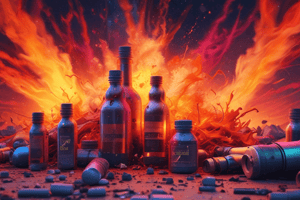Podcast
Questions and Answers
What characteristic distinguishes high explosives from low explosives?
What characteristic distinguishes high explosives from low explosives?
- High explosives detonate without confinement. (correct)
- High explosives are primarily used as propellants.
- High explosives require confinement to explode.
- High explosives can only be ignited by flame.
Which of the following is an example of a low explosive?
Which of the following is an example of a low explosive?
- Black powder (correct)
- RDX
- TNT
- Dynamite
What is a characteristic of primary high explosives?
What is a characteristic of primary high explosives?
- They have a pushing effect when ignited.
- They are packaged as blasting caps. (correct)
- They are less sensitive to shock than low explosives.
- They can be ignited with a flame.
Which of the following statements about low explosives is true?
Which of the following statements about low explosives is true?
Which example is associated with military explosives?
Which example is associated with military explosives?
What must initiate secondary high explosives?
What must initiate secondary high explosives?
Which of the following is NOT a characteristic of low explosives?
Which of the following is NOT a characteristic of low explosives?
What is a key feature of Improvised Explosive Devices (IEDs)?
What is a key feature of Improvised Explosive Devices (IEDs)?
What should never be used for packaging materials that continue to react when exposed to metal?
What should never be used for packaging materials that continue to react when exposed to metal?
What is the preferred method for submitting fireworks that are part of an IED?
What is the preferred method for submitting fireworks that are part of an IED?
Which of the following statements about intact devices is true?
Which of the following statements about intact devices is true?
What distinguishes legal from illegal fireworks in Virginia?
What distinguishes legal from illegal fireworks in Virginia?
What type of packaging is preferred for bottle bombs?
What type of packaging is preferred for bottle bombs?
What type of container should be used for volatile materials to prevent evaporation?
What type of container should be used for volatile materials to prevent evaporation?
Which method is recommended for packaging unconsumed low explosives?
Which method is recommended for packaging unconsumed low explosives?
What should be done if nitroglycerin-based dynamite is suspected?
What should be done if nitroglycerin-based dynamite is suspected?
How much of a pyrotechnic safety fuse or detonation cord should be collected?
How much of a pyrotechnic safety fuse or detonation cord should be collected?
What is the consequence of using regular plastic bags with low explosive powders?
What is the consequence of using regular plastic bags with low explosive powders?
When packaging bottle bombs, what should be removed from the bottle?
When packaging bottle bombs, what should be removed from the bottle?
Which container is NOT recommended for packaging low explosives?
Which container is NOT recommended for packaging low explosives?
What should be done to protect the ends of the pyrotechnic fuse during packaging?
What should be done to protect the ends of the pyrotechnic fuse during packaging?
What materials are most commonly used for constructing containers for explosive devices?
What materials are most commonly used for constructing containers for explosive devices?
Which of the following methods should be followed for the collection of intact, live explosive devices?
Which of the following methods should be followed for the collection of intact, live explosive devices?
What should be done with materials that have sharp edges and may contain volatile substances?
What should be done with materials that have sharp edges and may contain volatile substances?
Which of the following is NOT identified in the capabilities and services offered?
Which of the following is NOT identified in the capabilities and services offered?
What type of evidence is mentioned as being acceptable in a plastic bag unless latent print processing is requested?
What type of evidence is mentioned as being acceptable in a plastic bag unless latent print processing is requested?
What is required to accompany the submission of a live explosive device to the laboratory?
What is required to accompany the submission of a live explosive device to the laboratory?
What should comparison samples for explosive residues analysis consist of when analyzing concrete?
What should comparison samples for explosive residues analysis consist of when analyzing concrete?
Which method is recommended for collecting post-blast materials found near the explosion site?
Which method is recommended for collecting post-blast materials found near the explosion site?
Flashcards are hidden until you start studying
Study Notes
Explosives: Overview
- Explosives are classified as low or high.
- Low explosives are primarily used as propellants and generate large volumes of gas.
- Low explosives include black powder, black powder substitutes, smokeless powder, flash powder, match heads, and firework powder.
- Low explosives can be ignited with a flame.
- High explosives detonate and do not need confinement to explode.
- High explosives are designed to shatter and destroy.
- High explosives include initiating explosives such as mercury fulminate and lead azide, commercial explosives such as Tovex, ANFO, and dynamite, and military explosives such as TNT, RDX, and C-4.
- Primary high explosives are extremely sensitive to shock, friction, flame, and/or heat.
- Primary high explosives are often packaged as blasting caps and are HAZARDOUS.
- Secondary high explosives are relatively insensitive to shock, friction, flame, and/or heat.
- Secondary high explosives must be initiated with a shock wave, often produced by a primary high explosive.
- Improvised Explosive Devices (IEDs) can be constructed with a variety of common filler materials such as black powder, black powder substitutes, powder from fireworks, match heads, and chlorate/sugar mixtures.
- Commonly encountered IED containers include threaded metal or PVC pipe nipples with end caps.
Laboratory Capabilities and Services
- The Trace Evidence Laboratory offers specialized services for explosives analysis.
- Services include the identification of IED components, construction analysis, analysis of explosive fillers and residues, and the identification of unconsumed low explosive powder and high explosives.
- The laboratory also specializes in the analysis of bottle bombs.
Collection Guidelines for Explosives Evidence
- Intact, Live Explosive Devices: The lab will not accept live explosive devices. Qualified personnel must render the device safe prior to laboratory submission.
- Post-blast or Rendered Safe Evidence: Fragments with sharp, jagged edges or suspected volatile materials should be placed in clean, unused, lined, metal paint cans. Porous materials near the blast site should also be collected, along with comparison samples of similar materials.
- Unconsumed Low Explosives: Powder should be placed in a small, heat-, shock-, friction-, and spark-resistant container, such as a pink anti-static plastic bag. Do not use regular plastic bags due to the risk of static electricity igniting the powder.
- Undetonated Secondary High Explosives: Collect a small sample and package in a glass vial, plastic bag, or clean, unused, lined metal paint can. For suspected nitroglycerin-based dynamite, use a clean, unused, lined metal paint can.
- Pyrotechnic Safety Fuse or Detonation Cord: Collect no more than approximately a 6 inch piece, wrap in paper, and place in a plastic bag.
- Bottle Bombs: Remove any liquid and foil, package separately in plastic, and avoid using metal. Glass containers can be used, but the lid must be metal-free.
- Fireworks: Do not submit intact commercial fireworks unless necessary. Submit fireworks that are part of an IED, have been modified, or may have been the source of filler in an IED.
Submission Reminders
- Never submit live devices or intact blasting caps.
- Render any device safe prior to submission.
- Use clean, unused, lined metal paint cans for sharp metal objects or volatile materials.
- Use plastic for bottle bombs.
- Provide as much information related to the incident as possible on the Request for Laboratory Examination form (RFLE).
- Include details on the potential target, smoke, sound, and flash descriptions.
Studying That Suits You
Use AI to generate personalized quizzes and flashcards to suit your learning preferences.




